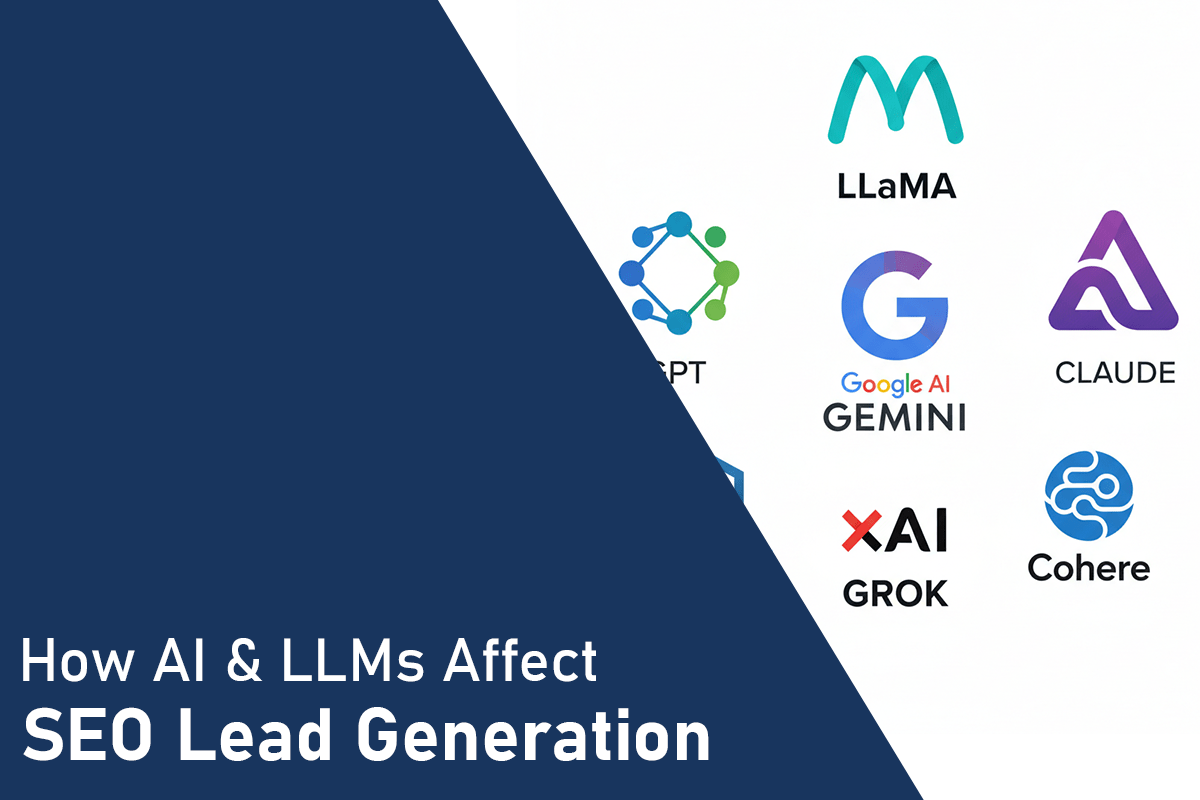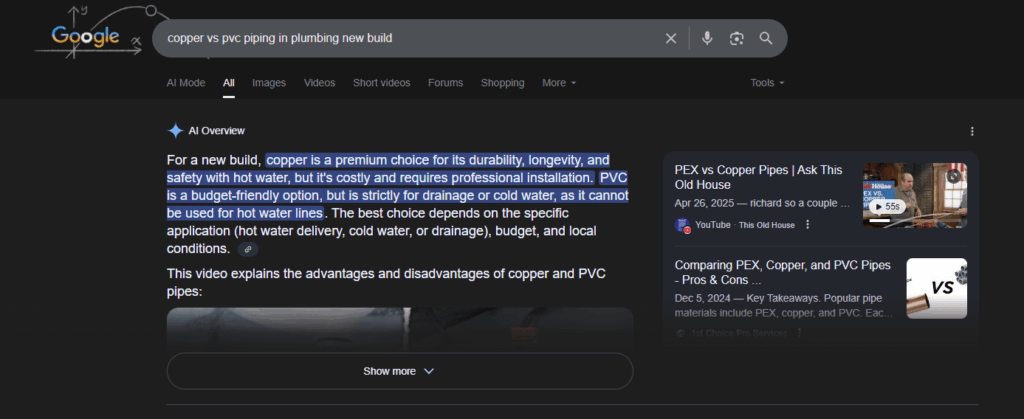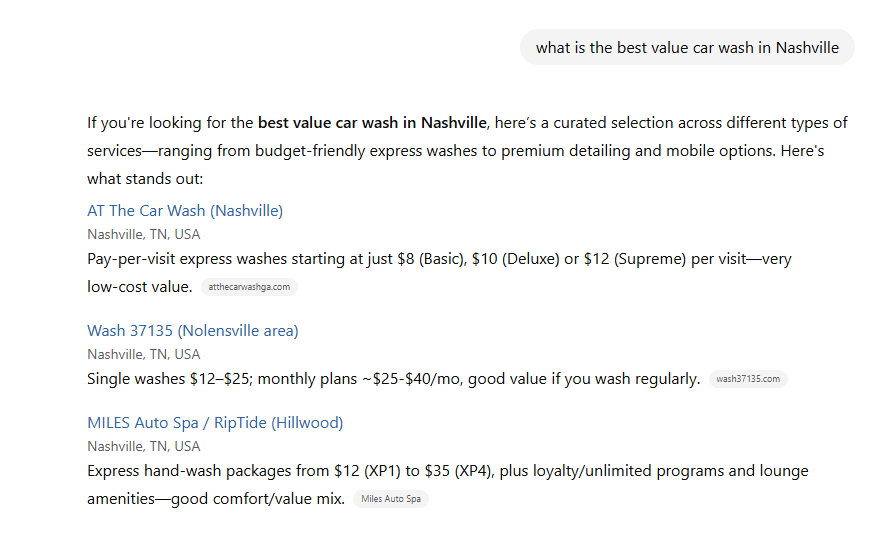Google AI Overview & LLMs – How Will They Affect Small Business SEO Lead Generation?

Leads are really the only thing that matters to small businesses.
Leads = Cash
Cash = Business stays afloat
Therefore, the purpose of digital marketing should be to generate leads for a business.
SEO has been a great vector of leads for us and our clients. It’s the reason we got into SEO in 2020 and offered it as a service to our web design clients.
But things are changing. ChatGPT came on the market in November 2022, and since then, there have been shifts in consumer behavior in search engines.
Our core focus at Bluestem Media is on small business lead generation, and we want to do a brief summary on how AI will affect digital leads and traffic moving forward. (And the advice we are giving our clients.)
For context, fifty-two percent (52%) of U.S. adults use AI large language models (LLMs) in a March 2025 survey. Of these adults, two-thirds are using LLMs like a search engine.
There are two primary tools that effect SEO right now: Google AI Overview and LLM Chat. Here’s how we are processing each:
Google AI Overview

Short version: Google is siphoning off clicks from “top of funnel” keywords, but purchase-intent keywords and branded keywords continue to generate clicks to websites and Google Business Profiles.
Long version: Google added an “AI overview” to the standard search engine. When a user types in a search term they believe will best be served by an AI result, they add the AI overview at the top.
A window appears, with an answer, see more button, and citations to the sources it’s drawing on.
This feature will likely reduce traffic to websites. If a user can find an answer to most simple-to-moderately complex questions in the search engine results page (SERP), there is no reason for a user to click into a website. This involves navigating a page, dealing with ads, etc.
The good news for small business lead generation: Most of the traffic Google AI is stealing is “top of funnel” traffic, meaning a user is in the research/information gathering mode. For the small businesses we work with, Google AI overview is not going to steal leads from you in this area. It helps users do research higher in the funnel, and as they change their queries to be more purchase/decision focused, websites, ads, and Google Business Profiles are featured more prominently in SERPs…at least for now!
LLM Chat

Short version: Websites will see a drop in unbranded, top-of-funnel traffic, and hold steady in branded search that converts users. People will do all research via LLM, and then visit a website to purchase/sign up.
Long version: Tools like ChatGPT, Gemini, Perplexity, and CoPilot have the potential to replace search engines like Google. Since they are conversational, each prompt builds on the previous, rather than starting fresh each time (like in a search engine). This makes for a more targeted answer.
The basic effect LLMs will have on SEO is that much of the research may move into the LLM chat. When a customer has selected a brand or business to work with, they will then visit the website directly (from a citation in the LLM) to simply search for you by brand name.
The hard part is measuring user behavior in LLMs. Since LLMs are private and unique to each user, there is almost no baseline with which to measure progress. The results generated by LLMs are directly tied to the conversation tree applied by the user. There have been some companies that have tried to build tracking tools, but the industry is still in its infancy.
What we do know: LLMs use website information to build responses. Each LLM has a primary search engine it uses for gathering the information. Gemini & Perplexity use Google, while ChatGPT & CoPilot use Bing. LLMs take the top-ranked content for a subject and use this to build the prompt return.
Which means, core SEO principles still apply.
Some SEO professionals are calling this “siteless SEO”, where you build a website and optimize it for SEO, knowing the LLM will log this information and return it to a user. But a user never clicks through to your site to read the information (unless they are ready to buy or do business).
Action Items for Marketers & Small Business Owners
So, what advice are we giving to our clients to keep leads flowing in the age of AI and LLMs?
SEO still works for service businesses and professional services
We are working with a client in the professional services space, who invested capital in a new website built this spring. We launched the website in July 2025, and as of September 2025 is generating leads. This will likely become the foundation of a case study (when I get time). Good design and clear calls to action, combined with an intelligent SEO strategy, will produce leads. People are still using traditional search to find real businesses.
Build a solid website with logical service pages, local landing pages, and a good “About Us” structure. Make it attractive and add at least two commitment levels and you’ll be good.
Schema markup on websites
All LLMs use the internet for training data, and will actively query the internet for more information. Each LLM has a primary search engine they use to research websites. One huge advantage is to make your website clean and easy to understand for these LLMs. Schema markup (a code-type language used to communicate relationships between objects, entities, etc., on a website) has been a huge focus for our team for the past few months. We have a tech stack that allows us to implement schema markup on our clients’ websites, including WP Schema Pro, WP Reviews Pro and Yoast SEO.
Do marketing like it’s 1950
Twentieth-century marketing is back with scrappy copywriting and brand-based advertising. It’s very hard to outrank Amazon and Home Depot; therefore, you need to do the things they can’t do. Provide good customer service, answer questions, and be competent at what you do. Above everything, you need to build a brand name and get branded search volume into your Google Search Console query list. (If you don’t know what this is, watch the video below. ) LLMs are looking to suggest brands based on the qualifications requested by the searcher. This is absolutely crucial to understand.
A client of mine sent an email today mentioning that a potential customer found them using ChatGPT. The business owner asked what search they did, and it was “best company to do [niche service]”.
Create a referral program, print bandit signs, sponsor your little league team, and talk to people in person. Even radio ads and podcast ads can help drive brand interest.
Use AI to automate processes, but invest in quality people
Large companies are trying to find ways to fire employees, hire offshore talent, and invest money in AI to replace human agency. I personally think this will fail in the end, and recommend to my clients that they lean hard into investing in quality people.
AI should be used as a force multiplier for your team, rather than replacing your team. We use a variety of AI tools at Bluestem Media. Gemini and Notion are the two most used tools, but we also have some other tools we use for generating images, pulling YouTube transcrips, etc.
I predict the market will experience “AI fatigue” in the next 12-48 months, and people will be looking for real human businesses.
If your business can give jobs to quality people and ride out the AI craze, you may win big in the end.
Wrapping up
AI continues to be a disruptor in the digital marketing space, especially as it relates to SEO. The most important thing to pay attention to will be market behavior, NOT what an SEO guru or influencer thinks will happen (including me). If the market at large adopts LLMs as the primary mode of search, Google Search may be dead. But until then, SEO keeps generating leads for us and our clients, especially for home services and professional services.
Isaac Wiinanen
Isaac is an SEO Strategist & Web Project Lead for Bluestem Media. Focused on local SEO, Google Business Profile optimization, and StoryBrand marketing.

